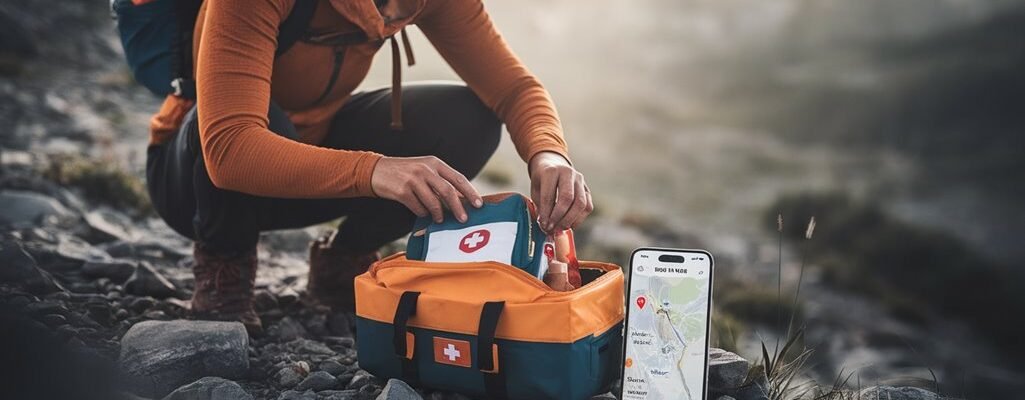
Emergency Preparedness: Handling Unexpected Situations While Traveling
When you travel, unexpected situations can arise at any moment, from medical emergencies to sudden disruptions in your itinerary. Being prepared means more than just packing your bags; it involves understanding risks, knowing what to carry, and having a clear plan for contacting help if needed. Taking these steps can make the difference between a minor inconvenience and a serious crisis. But what exactly should you focus on to stay safe and ready?
Assessing Potential Risks Before Your Trip
How can you ensure a safe trip? Start by assessing potential risks specific to your destination.
Research local weather patterns, political stability, and recent crime reports. Check travel advisories from reliable sources like government websites.
Understand health risks, including necessary vaccinations or outbreaks in the area. Consider natural disasters common to the region, such as earthquakes or hurricanes.
Evaluate transportation safety and infrastructure quality, especially if you plan to drive or use public transit. Identify any cultural or legal differences that might affect your safety.
By gathering this information, you’ll be better prepared to avoid hazards and make informed decisions throughout your journey.
Taking these steps doesn’t guarantee a problem-free trip but significantly reduces unexpected issues, helping you stay safe and confident while traveling.
Essential Emergency Supplies to Pack
Although you hope to avoid emergencies while traveling, packing essential supplies ensures you’re prepared if something unexpected happens.
Start with a basic first aid kit containing bandages, antiseptic wipes, pain relievers, and any personal medications.
Include a flashlight with extra batteries and a portable phone charger to stay connected during power outages.
Pack bottled water and non-perishable snacks to keep your energy up if food options are limited.
A multipurpose tool, like a Swiss Army knife, can be invaluable for various situations.
Don’t forget copies of important documents stored in a waterproof pouch.
Lastly, bring a whistle to signal for help if needed.
Creating a Travel Emergency Contact List
Packing emergency supplies is just one part of staying safe while traveling. Equally important is creating a travel emergency contact list. You should include phone numbers for close family, friends, your country’s embassy or consulate, and your travel insurance provider.
Don’t forget local emergency contacts, like the nearest hospital or police station. Keep both digital and physical copies of this list—store the digital version on your phone and cloud storage, and carry a printed copy in your wallet or backpack.
Share this list with someone you trust back home so they can assist if you can’t reach out. Having this information ready means you can react quickly and confidently during unexpected situations, reducing stress and helping you stay connected when it matters most.
Understanding Local Emergency Services
Where can you turn when an emergency strikes in an unfamiliar place? Knowing the local emergency numbers is your first step.
Different countries use different emergency codes—like 911 in the US, 112 in Europe, or 000 in Australia—so research and save these before you travel.
Identify nearby police stations, fire departments, and local hospitals by asking hotel staff or checking official websites. Keep a list of these contacts handy on your phone or paper.
Also, understand how emergency services operate locally; some places might require you to call a specific number for ambulance services, while others dispatch all help through a general emergency line.
Being aware of these details ensures you act quickly and confidently when seconds count.
Managing Medical Emergencies Abroad
Knowing how to reach local emergency services sets the foundation for handling urgent situations, but medical emergencies abroad require additional preparation.
First, carry a detailed list of your medical conditions, allergies, and medications in the local language if possible. Make sure you have travel insurance that covers medical emergencies and repatriation.
Locate nearby hospitals or clinics before you travel, and know which accept your insurance. If you need medication, bring an adequate supply and a doctor’s note explaining the prescription.
In case of illness or injury, seek care promptly rather than waiting. Keep emergency contacts handy, including your country’s embassy or consulate.
Finally, consider downloading medical apps that provide guidance or translate medical terms. Being proactive ensures you can manage health crises confidently while abroad.
Handling Lost or Stolen Documents
What should you do if your passport or important documents go missing while traveling? First, stay calm and retrace your steps to see if you can locate them.
If they’re truly lost or stolen, report the incident immediately to the local police to get an official report; this will help with replacements and insurance claims.
Next, contact your country’s embassy or consulate to report the loss and learn how to obtain emergency travel documents.
Keep copies of your IDs and important papers stored separately from the originals to speed up this process.
Also, notify your bank and credit card companies to prevent identity theft.
Taking these steps quickly helps minimize travel disruptions and keeps you secure while abroad.
Navigating Sudden Travel Disruptions
Losing important documents can derail your plans, but travel disruptions come in many forms, from sudden flight cancellations to unexpected weather events.
When these happen, stay calm and assess your options quickly. Check with airline staff or your travel app for alternative flights or routes.
If weather delays occur, find shelter and stay updated on conditions. Always have backup plans, like flexible bookings or travel insurance, to ease rescheduling.
Keep essential items accessible—chargers, snacks, and a change of clothes—to stay comfortable during long waits.
If public transport shuts down, consider ride-sharing or local taxis as alternatives.
Staying Connected During Emergencies
Although emergencies can strike without warning, staying connected ensures you can get help and keep your loved ones informed.
Before you travel, make sure your phone is fully charged and carry a portable charger. Download offline maps and emergency contact numbers, including local authorities and your country’s embassy.
Enable location sharing with a trusted friend or family member so they can track your whereabouts if needed. Use messaging apps that work on low bandwidth or Wi-Fi, in case cellular service is spotty.
Consider purchasing a local SIM card or an international roaming plan to maintain connectivity. Finally, keep a written list of important contacts in case your phone fails.
Staying connected empowers you to respond quickly and keeps everyone reassured during unexpected situations.
Practicing Safety and Awareness While Traveling
When you stay alert and practice safety, you reduce your risk of encountering problems while traveling.
Keep your belongings secure and be mindful of your surroundings, especially in crowded or unfamiliar areas. Trust your instincts—if something feels off, move to a safer location. Avoid displaying valuables openly to deter theft.
Always have a plan for emergencies, including knowing local emergency numbers and nearby safe spots. Stay informed about the area’s culture and potential risks to adapt your behavior accordingly.
Use well-lit, populated routes whenever possible, and don’t hesitate to ask locals or authorities for advice.
Conclusion
By preparing ahead, you’ll handle unexpected travel situations with confidence. Assess risks before you go, pack essential supplies, and keep a clear emergency contact list. Know how to reach local services and stay calm if medical or travel issues arise. Staying connected and aware helps you adapt quickly, ensuring your safety wherever you are. With these steps, you’ll enjoy peace of mind and focus on making the most of your trip.




